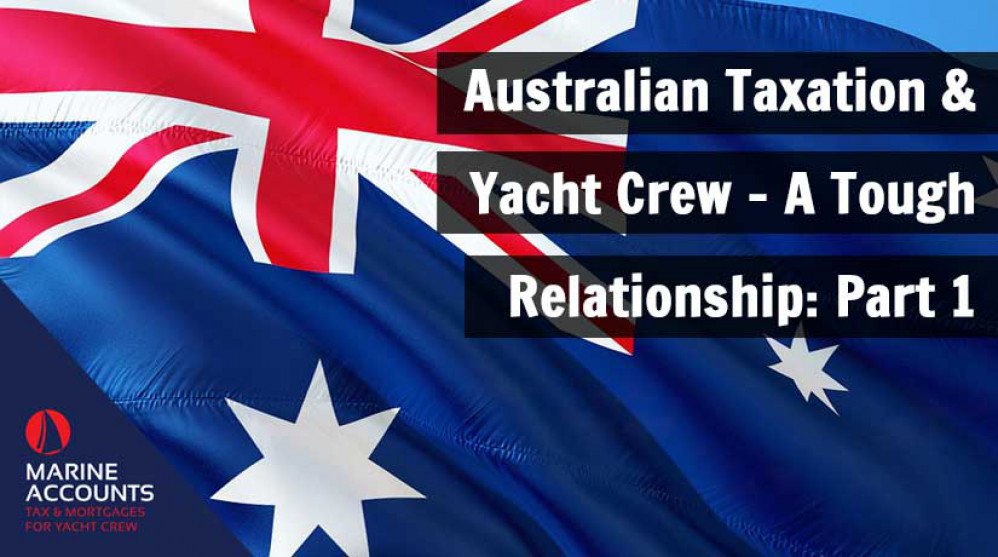Australian Taxation and Yacht Crew - A Tough Relationship: Part 1
- Authors
-
-

- Name
- Patrick Maflin
-

Image source: https://pixabay.com/photos/international-flag-australia-2690850/
Co-authored by Tania Waterhouse, Waterhouse Lawyers
On 1st September 2018, the ATO will start to receive financial information about Australian account holders following the introduction of the Common Reporting Standard (CRS) in 2014.
This means they will have access to information on any income held offshore.
As such, it may be time to begin asking yourself “how protected is the money I have from taxation?”
We speak with more and more yachties who spend little to no time in Australia yet are still trapped in the Australian tax system by unforgiving legislation.

Australia’s taxation rules are notoriously unforgiving, especially when it comes to seafarers.
Compared to many other jurisdictions, the ATO have no exemptions or deductions and a mountain to climb in terms of establishing yourself as non-resident, especially if you are a native.
What makes me an Australian resident for tax purposes?
The ATO will apply four tests to determine whether you are resident.
- The 183-day Test
- The Primary and Ordinary Concepts Test
- The Domicile Test
- The Superannuation Test
The most open to interpretation of the 4 tests is the Primary and Ordinary Concepts Test.
Under this you will be seen as an Australian tax resident if you are a resident by “ordinary concepts”.
What this means is that if you are seen to treat Australia as your home, you must pay your taxes there.
Under the Domicile Test, you must have “abandoned” your Australian domicile (which you have because you lived in Australia).
You maintain your status as Australian tax resident under this rule unless you have established a home outside of Australia since leaving, you will also need to sell or let any property you do still hold in the country.
If you have done so, you will be considered to have abandoned your Australian domicile.
This is the only way to overcome this test.
If I am considered a tax resident of Australia, how will this affect me?
As an Australian tax resident, your worldwide income from employment, investments and any other means will need to be declared in Australia by lodging a tax return with the ATO.
Failing to do so essentially constitutes tax evasion and comes with heavy penalties.
It is also important to remember that declaring yourself as non-resident can be treated in the same manner if you are unable to support this declaration in court.

Image source: https://pixabay.com/photos/australian-dollar-money-currency-2874029/
What can I do?
If like many others, you find yourself in the position of spending little to no time in Australia but are still a resident under the Domicile rule, we understand how frustrating it is to have to pay a significant portion of your income to the Australian Tax Office.
Below are a few simple steps you can take which will help you to demonstrate to the ATO that you are no longer an Australian resident:
- Remove yourself from the Electoral register.
- Apply the residency tests as explained above to your situation - remember you only need to pass one to be an Australian resident and the 183 rule is not the deal breaker.
- Sell or lease your Australian property - this will allow you to demonstrate you do not have a permanent home available to you in Australia
- Obtain a permanent living place abroad - this is the best option so that you are treated as a non-resident.
How to prepare for the worst case scenario
An ATO investigation into your tax affairs is the worst-case scenario.
If the ATO deems you to be resident and you have not met your obligations, you will be liable to pay interest on your unpaid tax as well as penalties which can almost double your original liability.
Tribunal hearings can be unpredictable based upon the individual circumstances of the case, how it is argued, and the luck of the draw when it comes to the AAT tribunal member or Federal Court judge ruling on the matter.
You may have a tribunal member or judge ruling on something outside their area of expertise and this can lead to unpredictable results.
If you are unsure of your residency position and would like more information please contact us to further discuss.
Speak to Us or Comment!
If you have concerns about your Australian tax residency status and how this affects your personal income tax obligations, we can help review your situation and offer advice. Alternatively, let us know what you think in the comments section below, or get in touch with us.
Please feel free to email us directly using the link below:
Click for Tax Return Advice for Seafarers & Yacht Crew
Liked this article? Try reading: Australian Taxation & Yacht Crew - A Tough Relationship: Part 2
Any advice in this publication is not intended or written by Marine Accounts to be used by a client or entity for the purpose of (i) avoiding penalties that may be imposed on any taxpayer or (ii) promoting, marketing or recommending to another party matters herein.


